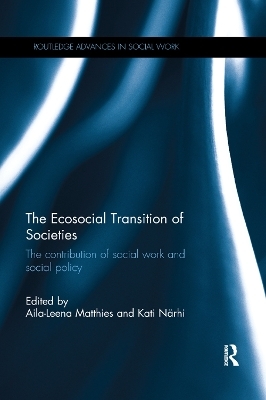
The Ecosocial Transition of Societies
Routledge (Verlag)
978-0-367-15220-8 (ISBN)
This groundbreaking book both explains and expands the growing debate on ecological (environmental) social work at the global level. In order to achieve this, the book strengthens the environmental paradigm in social work and social policy by undertaking further research on theoretical and conceptual clarification as well as distinct reflections on its practical directions.
Divided into five parts: concepts; the impact of environmental crises; sustainable communities and lifestyles; food politics; and the profession in transition, this work’s main objective is to place ecological social work as a part of the more comprehensive and interdisciplinary eco-social transition of societies towards sustainability, balancing economic and social development with the limited resources of the natural environment. By focussing on these five core concepts, it shows how social work and social policy contribute to this transition through having a research-based approach and orientation on solutions rather than problem analysis.
The book will be of interest to scholars from a broad range of disciplines, including those in social work and social policy, sustainability, economics, agriculture and environmental studies.
Aila-Leena Matthies is Professor of Social Work at the University of Jyväskylä, Kokkola University Consortium. She has been publishing about the ecosocial perspective of social work in Finnish, German and English since the late 1980s. Kati Närhi is Professor of Social Work in the Department of Social Sciences and Philosophy, University of Jyväskylä, Finland. Her main research interests are ecosocial approach in social work, ecosocial transition, community social work, structural social work, participation and user involvement.
Introduction
1. It is the Time for Social Work and Social Policy Research on the Ecosocial Transition
Part 1: Concepts
2. The Conceptualisation of Ecosocial Transition
3. The Relational Conception of Wellbeing
4. Community Based Economy and Ecosocial Transition
5. Thinking about Commons – A Post-capitalist Perspective for Social Work
Part 2: Tackling Challenges and Complexities
6. Ecosocial Work – Reflections from the Global South
7. Scopes for Adivasi-centred Ecosocial Work in an Indian Mining Region?
8. Instrumentalism and Environmental Justice: People’s Cooperative Renewable Energy in Mauritius
Part 3: Sustainable Communities and Lifestyles
9. An Ecosocial Model for the Sustainability of Vulnerable Communities
10. Social Work and Eco Activism: From Seed Bombs to Community Gardens, Bike Lanes to Sustainable Urbanism
11. Local Welfare Systems in Rural Finland as a Representation of Sustainable Development
12. Ecosocial Transitions – Exploring the Wisdom of Our Elders
13. Promoting Ecosocial Transition through Permaculture: A Practice Tool for Social Work
Part 4: Food Politics
14. Nordic Welfare Universalism, Charity Food Aid and Environmental Ethics
15. Farm to Table – Promoting Nutritious and Affordable Food in a State with Varied Cultural Traditions and Scarce Water
16. Food Poverty between Charity and the Human Right to Food: The Case of Urban Gardens in Slovenia
Part 5: Profession in Change
17. The Role of Social Workers in a Time of Ecological Crisis
18. Transforming the Profession – Social Workers’ Expanding Response to the Environmental Crisis
19. The Changing Understanding of the ‘Person in Environment’ in Social Work Practice
Conclusion
20. The Contribution of Social Work and Social Policy in Ecosocial Transition of Society
| Erscheinungsdatum | 29.04.2019 |
|---|---|
| Reihe/Serie | Routledge Advances in Social Work |
| Zusatzinfo | 12 Tables, black and white; 13 Line drawings, black and white; 13 Illustrations, black and white |
| Verlagsort | London |
| Sprache | englisch |
| Maße | 156 x 234 mm |
| Gewicht | 498 g |
| Themenwelt | Sachbuch/Ratgeber ► Gesundheit / Leben / Psychologie |
| Sozialwissenschaften ► Ethnologie | |
| Sozialwissenschaften ► Pädagogik ► Sozialpädagogik | |
| Sozialwissenschaften ► Soziologie | |
| ISBN-10 | 0-367-15220-7 / 0367152207 |
| ISBN-13 | 978-0-367-15220-8 / 9780367152208 |
| Zustand | Neuware |
| Informationen gemäß Produktsicherheitsverordnung (GPSR) | |
| Haben Sie eine Frage zum Produkt? |
aus dem Bereich


